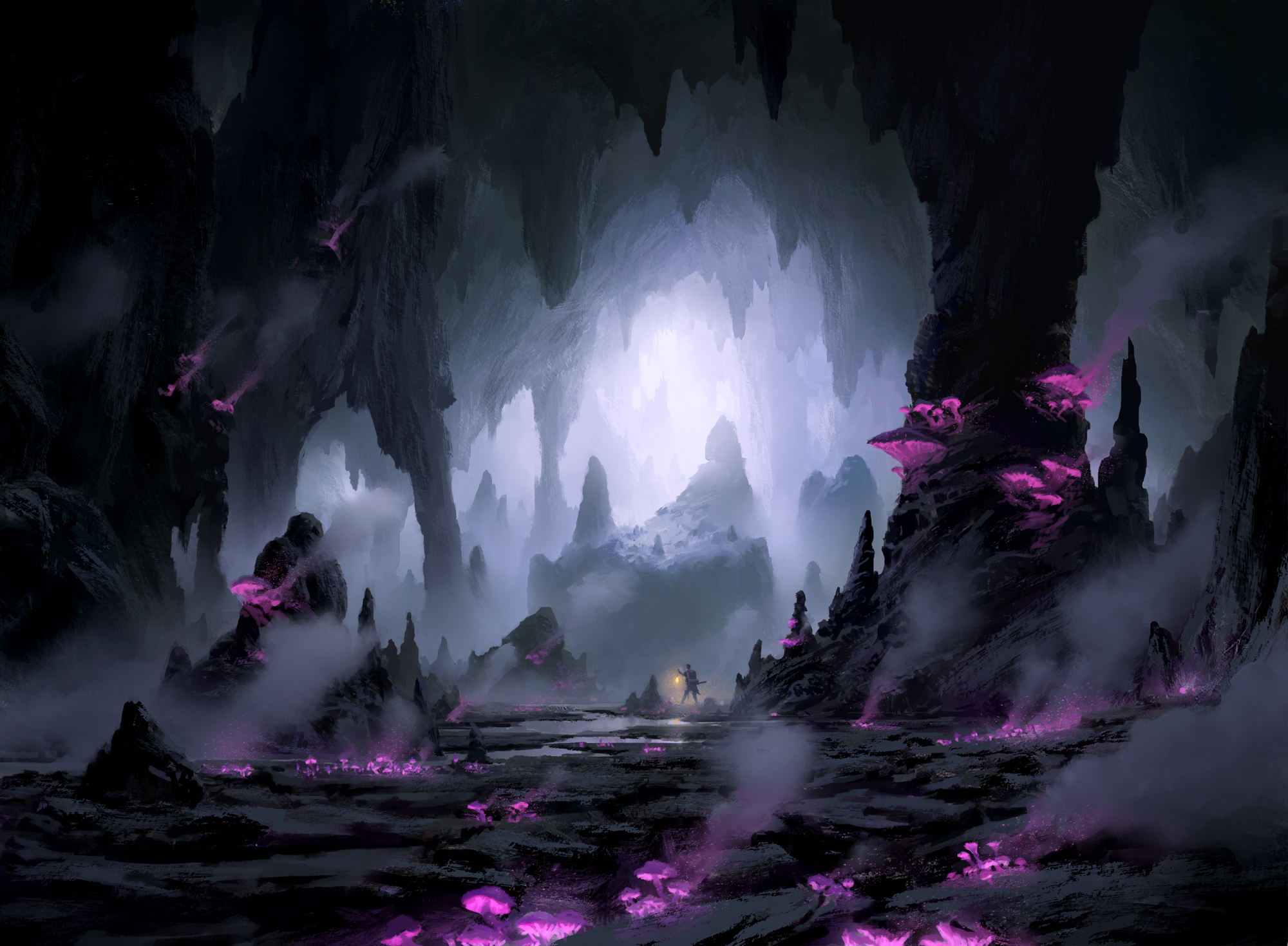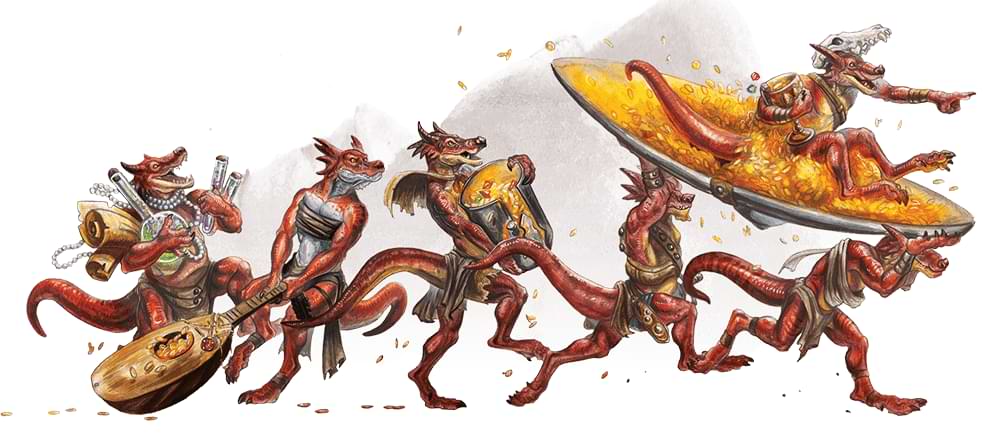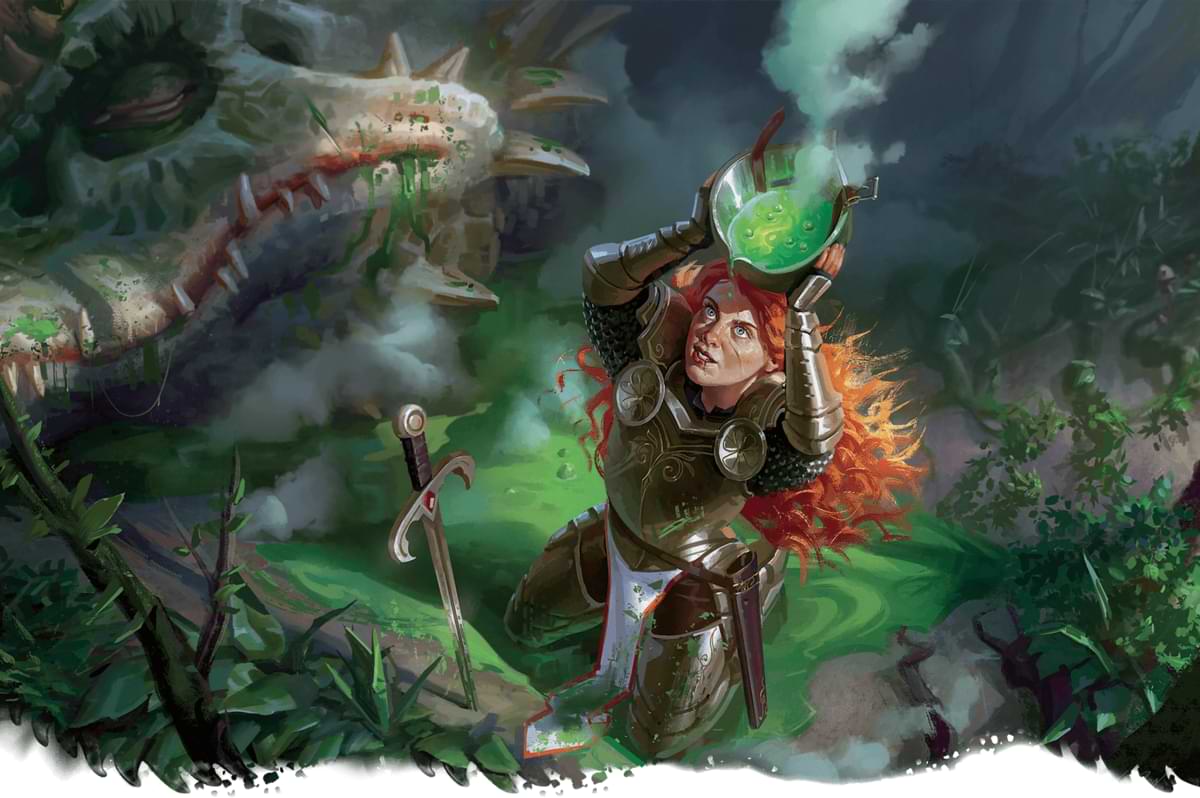Dragons are not only some of the most powerful and cunning enemies in Dungeons & Dragons lore, they're said to be creatures of immense magical energy. So powerful are they that their treasure hoards can spawn magical items, and their very life force can impart blessings (or curses) on those who slay them.
Whether you're picking up Dragonlance: Shadow of the Dragon Queen or planning to run another dragon-themed adventure, you can begin preparing for your own epic dragon encounters with Fizban's Treasury of Dragons and the Dungeon Master's Guide. These resources not only help you level up your dragon tactics but also inspire ideas for one very important question: What happens when you kill a dragon?
- Kaboom! The death throes of a dragon
- A rapidly changing environment
- Minions with no one to follow
- A lair with no one to call it home
- Vengeance from nearby dragons and gods
- Parting gifts
Kaboom! The Death Throes of a Dragon
As you land the finishing blow and the dragon collapses to the earth, you let out a cheer. The dragon is dead! Or is it?
Like any good villain, a dragon could get one last hit in before your players can ask, "What do we loot?" Fizban's Treasury of Dragons offers a few recommendations for a dragon's death throes, including a roll on the Wild Magic Surge Table (fireball, anyone?) or one final breath attack.
Personally, I like my villains to utter parting words, and you can bet I enjoy making my players feel bad for killing them. Because dragons are creatures believed to be wound up in the fabric of magic, you might weave a geas into a dragon's parting words, thrusting the party onto their next quest. Alternatively, their uttered words may be subject to sending, the recipient being their next of kin.
For adventures where the party may be hunting dragons of different types, switching up the effects of a dragon's death throes can keep the players on their toes. Will the dragon pull the party into the acidic waters of its lair or become a marble statue that could serve as a fine decorative piece for their home base? The choice is up to you—or the dice.
A Rapidly Changing Environment

When a dragon reaches a certain age, its magic begins to affect the region surrounding its lair. Earthquakes trouble the lands inhabited by an adult red dragon; waters foul near an adult black dragon's home; and mists that scare off evil-doers protect resident adult gold dragons. Although these regional effects will fade after a dragon's death, magic is a fickle thing and could lead to some curious—and even devastating—results.
Collapsing Ecosystem
Dragons can dwell on lands for centuries, reshaping entire ecosystems and influencing the way of life for nearby townsfolk. So, what happens when a dragon's magic fades? Depending on how people, plant life, and animals have adapted to life on the dragon's lands, a sudden change in the environment could lead to the collapse of ecosystems and economies. Whole towns could fold if their main source of income was trading magical flora sustained by a dragon's magic, for example.
Druids may seek to punish the party for causing famine and the destruction of natural habitats. Even the quest-giver—say, a mayor—could turn on the party, claiming that they hadn't sought out the dragon's death but simply negotiations. What started as a dragon hunt may culminate in the party being deemed villains.
The Rise of Dragonborn and Kobolds
As the Dungeon Master, you can craft unique origins for draconic folk like dragonborn and kobolds. You could decide that the burst of magical energy released by a dragon's death could lead to the spontaneous emergence of these people in nearby areas. Just as mysteriously as a dragon egg could appear, a dragonborn infant could be found napping among resting sheep. In such a case, would the party be responsible for ensuring the child's safety? And what will they do or say if the child has been imbued with some of the dead dragon's memories? Such an ill-fate could lead the child to grow up to resent the party and even become a villain themselves.
Minions With No One to Follow
What is a minion with no leader to follow? If you've vowed to protect a dragon until your dying breath, are you off the hook when they do die? I've certainly had that awkward (see: hilarious) moment in my sessions when a boss goes down before their followers. In such cases, the minions could take one of four actions:
- Continue fighting while vowing to bring their boss back at any cost
- Flee, as they are no longer bound by contract or threat to continue fighting
- Surrender and hope they are spared
- Kneel and proclaim their fealty to the party
Consider the creatures' motivations, as well as their Intelligence and Wisdom scores, to determine the best course of action. If the party is on their last leg, the minions may try to knock them out and use them as a bargaining chip to win the favor of another dragon or get out of now-hostile lands. For hilarity, the minions may believe that they must serve anyone who slays their leader. These minions could be terrible at their duties, garrulous, and needy. To rid themselves of the pesky minions, the party would need to fake their own death or find a way to outrun them.

A Lair With No One to Call It Home
A lair without a villain is just an ordinary cave, or a swamp, or a hole in the ground. In the case of a dragon's lair, though, it's one that's filled to the brim with treasures. With no threats in the vicinity, you may let the party devise a plan for looting it. They may even choose to make a new base of operations for themselves within it. Leftover ambient magic could allow them to create a permanent teleportation circle to a convenient location. Allowing the party to establish a new home base would give them ample opportunity to spend their hard-earned gold.
Should the party choose to abandon the lair, another creature could claim it. Perhaps minions that originally fled during the dragon fight later return to the lair and deem themselves the new rulers of the lands. Their rule may be short-lived but could nevertheless be an eventful consequence of the party making a hasty exit.
Alternatively, you could have the lair collapse in on itself. As the regional effects of a dragon's magic dim, so too could the structural integrity of its home weaken. For DMs who hope not to flood the characters with magic items, a collapsing lair could both maintain tension after a dragon fight as well as encourage players to roll from a random loot table as their characters make their escape.
Vengeance From Nearby Dragons and Gods
News of dragon slayers in the region could cause a stir among other dragons. The party's motives may be unclear or be miscommunicated, so much so that all dragons in the region could suddenly fear for their lives—and seek to strike first. A deity such as Takhisis who was worshipped for ages by a dragon may curse the party for striking down one of their followers.
Van Richten's Guide to Ravenloft introduced curses that are much harder to remove than your typical curse. Uttered with a dying breath or shelled out by a powerful entity, these curses could have monumental drawbacks, such as:
- Levels of exhaustion that can't be removed by normal means
- Vulnerability to a specific damage type
- A massive drop in one ability score
Such a curse might only be reversed if the party makes reparations. For example, they may be tasked with delivering a dragon egg to an ancient dragon of the same type that they killed. Or they may be forced to give away most, if not all, the treasure they looted from the dragon's hoard.
What of the Dragon's Rider?
Some truly epic villains ride into battle aloft a dragon. If the rider isn't present during the dragon encounter or flees before the killing blow lands, the party will need to contend with them at a later time. The party may find themselves facing off against a foe overwhelmed with fury, their bond with their mount severed after years of battle together. Perhaps the dragon rider finds a new mount, one that is more powerful than before, or they strike a deal with a necromancer to have the slain dragon brought back from the dead.
Parting Gifts

As a dragon dies, it may choose to pass on a gift to someone nearby. This may be their killer or it could be someone the dragon has chosen as an heir to their power. They may lay a claw on the chosen one or breathe their last breath onto them. This gift can take on any number of forms, with Fizban's Treasury of Dragons offering a few examples:
- You gain the ability to cast find familiar as a ritual without the need for material components. The conjured critter always appears as a pseudodragon.
- As a bonus action, you can use Frightful Presence to frighten your foes. You can use this feature a limited number of times per day.
You can also look to the charms presented in the Dungeon Master's Guide or the Dark Gifts in Van Richten's Guide to Ravenloft for inspiration.
Even if the dragon chooses not to pass along its power, the party may be able to harvest it after the creature's death. If you're feeling metal, drawing on this power could require bathing in the dragon's blood or consuming some part of it. Doing so could come with inherit danger. Perhaps the dragon's blood is acidic or its flesh quickly rots as it is eaten.
When a Dragon Refuses Death
In D&D, death doesn't always stick. That's particularly true for dragons in the Dragonlance setting. When a dragon's remains are infused with the lingering power of the Cataclysm, they may rise as a death dragon, a creature consumed with a need for vengeance. Learn more below:
Michael Galvis (@michaelgalvis) is a tabletop content producer for D&D Beyond. He is a longtime Dungeon Master who enjoys horror films and all things fantasy and sci-fi. When he isn’t in the DM’s seat or rolling dice as his anxious halfling sorcerer, he’s playing League of Legends and Magic: The Gathering with his husband. They live together in Los Angeles with their adorable dog, Quentin.








-
View User Profile
-
Send Message
Posted Nov 15, 2022I can see a dragon bestowing a combined boon and curse on its killers, granting them great power but at great cost. Like, forcing them to bear new burdens of responsibility or compulsion to perform tasks, with maybe even forced physical changes on them. They become that dragon's replacement. Like in DOTA anime on netflix.
-
View User Profile
-
Send Message
Posted Nov 15, 2022Ironic timing with DragonMag.com being deprecated today.
-
View User Profile
-
Send Message
Posted Nov 15, 2022I had a campaign where some players killed a dragon, and used it's lair as a home base, they hired stone masons, constructors, and other builders to revamp the lair into a fortress in a mountain. They even took the dragon's army of kobolds to gather treasure and wealth at their command, and basically became dragons themselves, it was funny.
-
View User Profile
-
Send Message
Posted Nov 15, 2022This is really cool! I'll definitely be using this!
-
View User Profile
-
Send Message
Posted Nov 15, 2022Great article! Helpful for a conclusion of an epic adventure.
-
View User Profile
-
Send Message
Posted Nov 16, 2022I remember when you could eat the heart and get one of the dragon's traits. but that was 30 years ago.
-
View User Profile
-
Send Message
Posted Nov 16, 2022SICK!!!!!!!!!!!!!!!!!!!!!!!
-
View User Profile
-
Send Message
Posted Nov 16, 202230 years ago, extreme food poisoning was also common amongst dragon-slayers.
-
View User Profile
-
Send Message
Posted Nov 16, 2022Dragon liver can cure a cold. Dragon powder grows hair. With Dragon blood, you'll never grow old. The rhymes go on and on.
...but: https://youtu.be/FcDkgeYFKsw?t=150 (Commander Shepard is one of the starring roles when watching the whole episode.)
-
View User Profile
-
Send Message
Posted Nov 16, 2022"30 years ago, could you blame em? What temperature do you cook a red dragon heart? There was no google so we ate it raw, died, and we liked it."
- Grog Boomer, Expert OSR evangelist
-
View User Profile
-
Send Message
Posted Nov 16, 2022When a Green Dragons dies it weakens the barrier between the Prime Material Plane and the Feywilds in the immediate area, causing an almost explosive boost to plant growth, creating a lush, beautiful grove of fey-thouched plants, though most of them will be quite poisonous.
-
View User Profile
-
Send Message
Posted Nov 16, 2022I like this. Call the police, I'm stealing this idea.
-
View User Profile
-
Send Message
Posted Nov 16, 2022Idea? It's canon. At least it was in earlier editions.
-
View User Profile
-
Send Message
Posted Nov 16, 2022Cool Man, this was really interesting
-
View User Profile
-
Send Message
Posted Nov 16, 2022Takihsis couldn't give a fig about anyone dying. Her worshipers go to the abyss and makes her stronger. She didn't even defend Ariakan, or Verminard. She actually tried to kill Mina on several occasions for drawing more praise than her. Also, Krynn dragons aren't the all powerful magic beings like in other worlds. Krynn dragons are just another creature type. They are much smaller, and don't get more powerful with age. Other Dragons wouldn't care either because they are highly territorial and it removes competition. However, a mate may be upset. Other things that would happen.
1. A more powerful dragon, seeing a vacuum would take over the layer.
2. The dragon horde would flood the economy with money, causing runaway inflation.
3. A coveted magic items in the Dragon's layer draws the attention of an Evil Wizard or Warlord.
4. With access to the Dragonhorde, a local town becomes extremely prosperous, drawing the attention of local lords.
-
View User Profile
-
Send Message
Posted Nov 16, 2022Yay! More reasons to kill of my player's characters!
-
View User Profile
-
Send Message
Posted Nov 16, 2022I should've known that earlier when my players defeated Venomfang, the Green Dragon, in the Lost Mine of Phandelver campaign!
-
View User Profile
-
Send Message
Posted Nov 17, 2022The only thing I would advise against is to put too many "gotcha" moments into the campaign in regards to the creature's motivations or repercussions.
Sometimes a monster is just a monster, it needs to be slain and that's all there is to it.
-
View User Profile
-
Send Message
Posted Nov 17, 2022that would be,, interesting
-
View User Profile
-
Send Message
Posted Nov 17, 2022smash